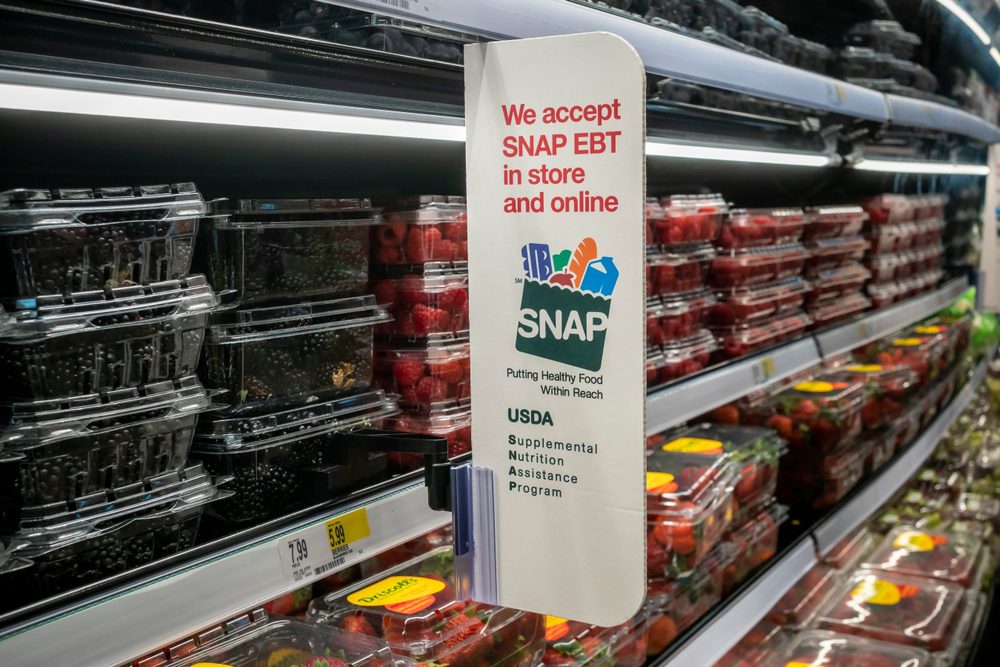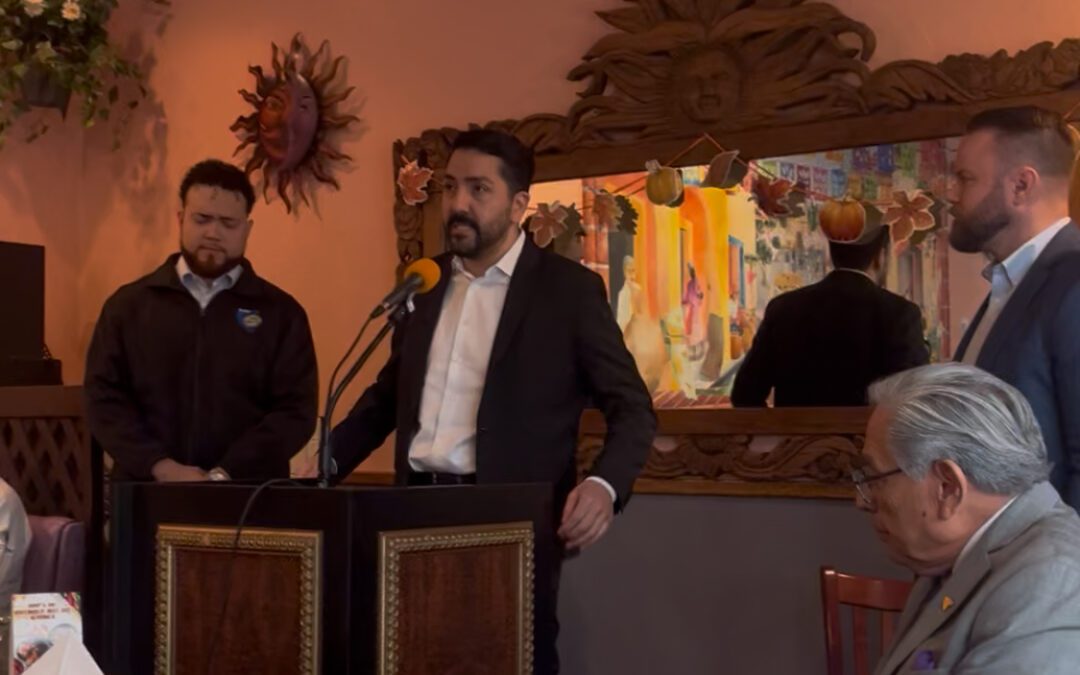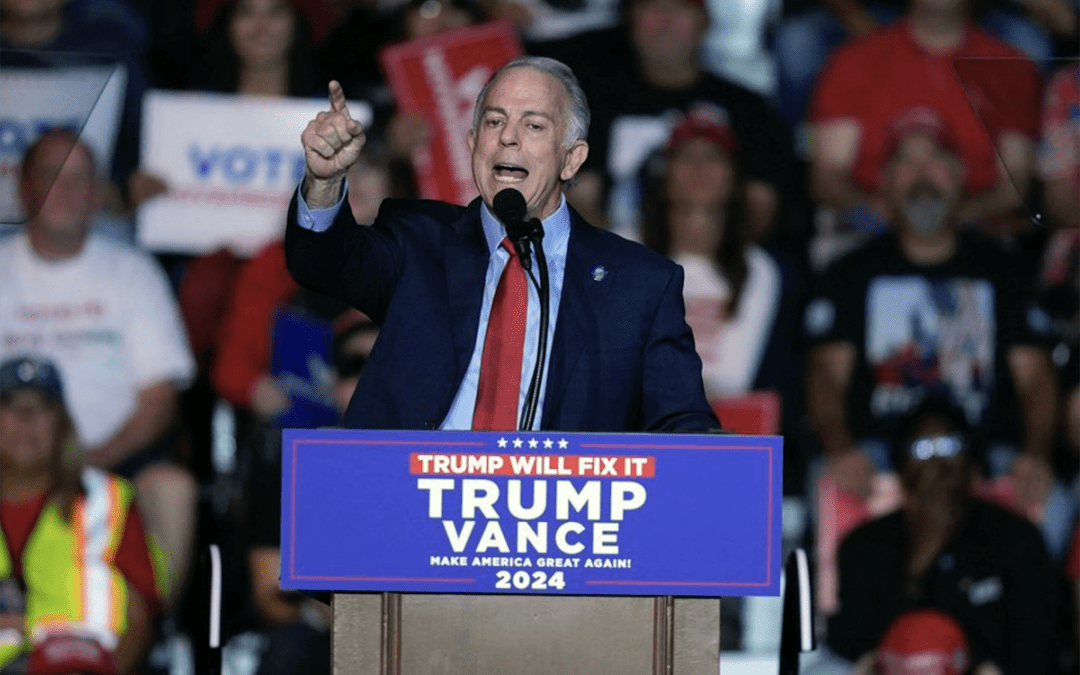
A grocery store sign announcing it accepts Supplemental Nutrition Assistance Program (SNAP). (Shutterstock)
By April Corbin Girnus
Gov. Joe Lombardo’s deputy chief of staff and finance director told lawmakers a special legislative session will happen in November and will include funding issues for the Supplemental Nutrition Assistance Program, better known as SNAP.
“As we all know, we will be having a special session later in November,” Tiffany Greenameyer, the director of the governor’s finance office, said to lawmakers during a legislative Interim Finance Committee (IFC) Thursday.
Greenameyer’s comment came after Senate Majority Leader Nicole Cannizzaro asked whether the governor’s office was concerned that the IFC contingency account now only has $2.9 million remaining in it after $30 million was transferred out to be given to food banks in preparation for an expected surge of demand from SNAP recipients beginning Saturday.
“We do plan on replenishing the IFC contingency account” during the special session, said Greenameyer.
Debi Reynolds, Lombardo’s deputy chief of staff, added that the governor “also intends to put language in the declaration to address funding for the SNAP program” in the event of a prolonged government shutdown.
“We are looking at all options to be able to continue funding food benefits for SNAP participants to the extent we can do so within the law,” she added.
Reynolds later told lawmakers the governor’s office has not had conversations about tapping into the state’s flush Rainy Day Fund.
“We have, however, had conversations about looking at funds that are available in the ending fund balance that could be used as a one-time appropriation,” she said.
According to Greenmeyer, Nevada’s ending fund balance is currently above 13% in the current fiscal year, which began July 1, and the last fiscal year ended at approximately 25%.
Greenameyer and Reynolds comments come a day after Lombardo, speaking to press after an event at a charter school, said his office could potentially take action on SNAP. Lombardo stopped short of saying it would happen during an upcoming special session.
The federal government is not paying November SNAP benefits, citing the government shutdown that began Oct. 1. For Nevada, it means $90 million per month of food assistance benefits will not be loaded onto the electronic benefit transfer (EBT) cards of nearly 500,000 people starting Saturday.
In response, state lawmakers have approved nearly $39 million in funding to help food banks; $30 million came from the IFC contingency account, which lawmakers on the IFC unanimously approved Thursday. The rest was transferred from previously approved various American Rescue Plan Act projects that either came in under budget or had a significant portion of their money remaining.
The State of Nevada, through Democratic Attorney General Aaron Ford, joined with more than two dozen other states to sued the Trump administration over SNAP, and asked a federal judge to compel the release of $5 billion in contingency funds at the federal level. A judge Friday, Oct. 31, gave the Trump administration until Monday (Nov. 3) to respond to her finding before she decides on a motion to force the benefits be paid despite the ongoing government shutdown.
A separate federal judge issued a restraining order on the Trump administration Friday and ordered it to continue SNAP payments.
It was unclear Friday how the administration would respond and if SNAP payments would be made.
What more could Nevada do?
Nevada Division of Social Services administrator Robert Thompson told lawmakers the state has talked to its third-party vendor extensively and determined it has the ability to mirror the SNAP program and create a substitute cash assistance program that could load money onto existing EBT cards.
The cost of doing so would be “minimal” and the timeline just one week, added Thompson, but the USDA has advised that doing so would put the state’s social service programs at risk in the future.
“They would not quantify to me what that risk meant,” said Thompson. “I could not come to you and tell you that there was a financial penalty, or if I would just receive a slap on the wrist. I don’t know.”
The Trump administration’s position is that it is not permissible for the state to tap into the personal data from the SNAP program to provide substitute cash assistance because the state does not have an existing general cash assistance program at the state level, Thompson told lawmakers.
“Because we do not have that, there was not a methodology that would allow us to follow federal regulations to mimic (SNAP),” he said.
Assembly Speaker Steve Yeager, who a day earlier issued a statement saying he was ready to declare a fiscal emergency in an attempt to find solutions to fund SNAP, said he was “confounded” by the situation.
“I don’t doubt that they said that to you,” he told the SNAP administrator, “but I think regardless of that we have to do something. This (food bank) program we’re standing up here is great, but it’s not SNAP.”
Democratic Assemblymember Sandra Jauregui said she’s spoken to lawmakers in other states that are standing up their own SNAP substitutes.
“Our concern shouldn’t be what the federal government is going to do to us…,” she said. “Because the priority should be putting food on the table of families. Families are not going to be able to buy groceries. Kids are going to go to sleep hungry. Seniors are not going to put food on their table. And that should be the first priority.”
Jauregui also emphasized the need to spread the word about the SNAP stoppage and the availability of food at food banks.
State workers have been processing new SNAP applications as normal, but they’ve had to tell everyone that the benefits they are applying for won’t be delivered for the foreseeable future.
“This work has always been emotionally draining, but this week it has been heartbreaking,” said Nalani Page, a family support specialist for state and member of AFSCME Local 4041.
She added, “Many of us workers are committed to social services because these services like SNAP got us through, pulled us through.”
Economic impact
State Sen. Rochelle Nguyen said she was concerned about how the $90 million SNAP pause would negatively impact local grocers and convenience stores who rely on SNAP.
SNAP supports more than 389,000 jobs, $20 billion in wages, and $4.5 billion in tax revenue nationwide, according to the National Grocers Association (NGA), a trade association representing independent supermarkets.
Every $1 of SNAP generates between $1.50 and $1.80 in economic activity.
The United Food and Commercial Workers International Union, which represents 1.2 million workers in grocery, retail, meatpacking and food processing, has made the same case, writing in a letter to USDA Secretary Brooke Rollins that any lapse in funding will “reduce hours and wages for food workers in every state and congressional district in the country.”
NGA leaders have said that SNAP accounts for 12% of all grocery sales nationwide. For some grocers it can account for more than half of all their sales.
Brian Wachter of the Retail Association of Nevada echoed that sentiment in comments to Nevada lawmakers Thursday. He said smaller, independent retailers will be disproportionately impacted when SNAP recipients cannot buy food.
“Those businesses are going to see declines in sales of, you know, 50, 60 percent probably over the next week,” he said. “That’s going to have a huge impact on the ability for those guys to stay afloat during this time.”
Staffing and inventory are planned around SNAP benefit cycles, NGA President & CEO Greg Ferrara said in a statement Wednesday, “so a lapse in funding could lead to reduced employee hours, perishable food losses, and declining sales.”
He continued, “Furthermore, when benefits are restored, the resulting surge in demand could strain supply chains nationwide.”
This story was updated to reflect rulings from federal judges.
Nevada Current is part of States Newsroom, a nonprofit news network supported by grants and a coalition of donors as a 501c(3) public charity. Nevada Current maintains editorial independence. Contact Editor Hugh Jackson for questions: [email protected].

Lawmakers debate proposed film studio bill: ‘For every dollar, we’d lose 77 cents’
By April Corbin Girnus The proposed Summerlin movie studio bill now under consideration by lawmakers in a special legislative session could force...

What could a major film studio investment mean for East Las Vegas?
A controversial film tax credit bill is being decided at Nevada’s special session. While it has detractors, local Latino leaders believe it will...

Gov. Lombardo calls Nevada special session for film tax credits, crime, much more
By Mark Robison, Reno Gazette Journal Gov. Joe Lombardo issued a proclamation Wednesday evening calling the Nevada Legislature into a special...

3 nuevas leyes en Nevada que afectan a la comunidad latina
Suscríbete a Vegas Somos y recibe noticias como esta a tu email Desde el 1 de julio entraron en vigor 190 proyectos de ley aprobados durante la...

Nevada’s Governor rejects record number of bills, again
Despite legislative efforts to provide housing relief, Gov. Joe Lombardo vetoed many bills that would do just that. Surpassing his record-breaking...

Here’s where major bills stand at the end of Nevada’s legislative session
Among the bills that survived is a voter ID bill that the president of the NAACP Las Vegas said could further disenfranchise the most vulnerable...




